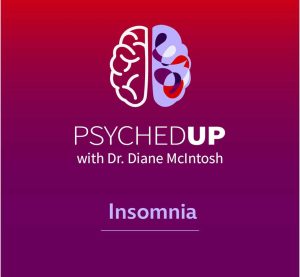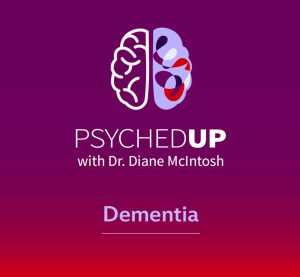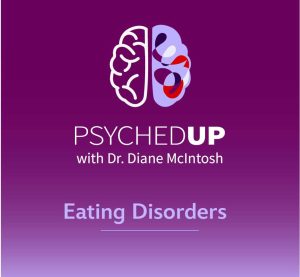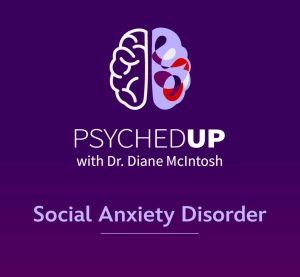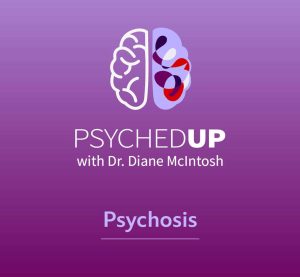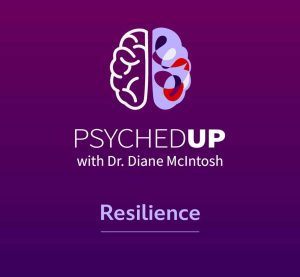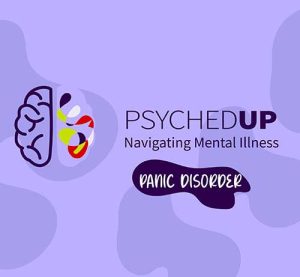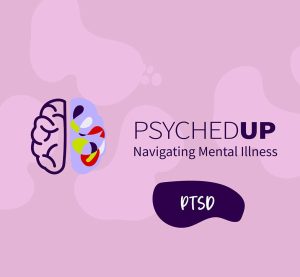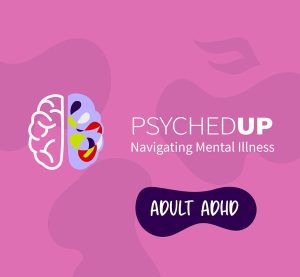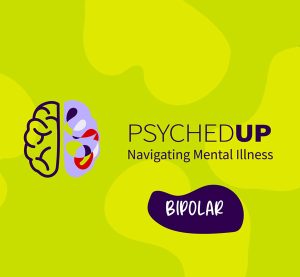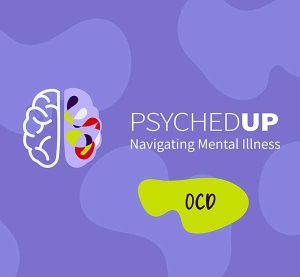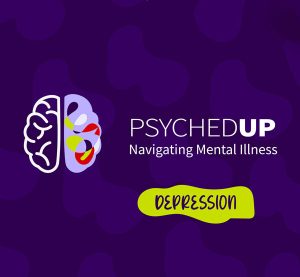
Episode 1: This is Depression
Silken Laumann captured the hearts of Canadians with her incredible resilience, rowing to a bronze medal in single sculls despite a devastating injury. But after the cheers faded, she realized she was facing a new challenge: depression.
In this episode, host Dr. Diane McIntosh sits down with Silken to explore her journey, discussing the symptoms, causes, and path to understanding her mental illness. Dr. McIntosh is later joined by her colleague and friend, Dr. Randy Mackoff, for an honest and insightful conversation about effective treatments for depression.
It doesn’t matter who you are, what you’ve done, whether you’re an Olympic superstar or not, depression can affect anyone. Listen to this episode of PSYCHEDUP to get educated and inspired.
Listen to This is Depression:
This is Depression Transcript:
00:00:01
Dr. Diane McIntosh: This episode contains topics that are difficult and upsetting for some people. Please listen with care.
00:00:07
Silken Laumann: I’ve been feeling good and suddenly I felt fat. I felt ugly and everything like every demand that I felt was placed on me just felt too much and it was so fast, it scared me actually.
00:00:22
Dr. Diane McIntosh: This is what depression felt like for four-time Olympian, Silken Laumann. But the symptoms can really vary from person to person. This episode we’re going to learn more about depression, what we know about it, its causes, symptoms, and essentially what it’s like to live with it, and then how to treat it. I’m Dr. Diane McIntosh. You’re listening to PSYCHEDUP. On this show, each episode will focus on one mental illness. Today it’s depression. As a psychiatrist, I want everyone experiencing any of these illnesses to be able to hear these stories and know that there’s a path ahead. My goal is to educate, destigmatize, and inspire.
Welcome to PSYCHEDUP. So a diagnosis of depression is also known as major depressive disorder. It requires a person to have either a depressed mood or anhedonia, which is a loss of interest or pleasure in things that you would normally enjoy. There are many symptoms of depression, and I’ll get into that. But first I’d like to introduce you to someone I am so excited is our guest today. By any standard, she’s a remarkable Canadian and an incredibly courageous person. She has an amazing podcast Inflection Time where she talks to inspiring Canadians who have remarkable stories. She’s also a speaker, an author, and a mental health advocate. But what really captured the imaginations of Canadians and my own little rower’s heart is as an Olympian, ultimately a four-time Olympian.
00:02:00
Silken Laumann: And I forgot you were a rower. I totally forgot.
00:02:02
Dr. Diane McIntosh: I am a rower in a way that is not like you are a rower… Yes, she is. Canadian rower, Silken Laumann. All right. I’ve got so many questions. So let’s just start at the beginning. When did your struggles with mental illness begin?
00:02:19
Silken Laumann: For quite a long time in my health journey and my mental health journey, I really didn’t understand that what I was experiencing was mental illness. And for me, the first clue was rage. I would feel so much rage in moments with my kids, with my little beautiful children who weren’t doing anything wrong, but it would just come up so fast. And of course, then I would feel ashamed. It wasn’t really about depression. It was about why do I feel so out of control. Why do I feel so angry sometimes? And honestly, I don’t really want to go back into my past. I don’t really want to look at what happened when I was a kid, because in part my mind, I was like, well, my parents loved me. We grew up in middle-class Mississauga, Ontario. I had a good life and I wanted to keep that version. But in order to move forward and to really become the parent I wanted to be, I needed to go back and to look at some of the crap and do some healing. I had quite a bit of childhood trauma. I had a mum who probably had borderline personality disorder, as well as other things completely untreated, living in that environment where I couldn’t feel safe, where I didn’t have unconditional acceptance or love or affirmation any of those things, which a lot of people don’t have, but it affects us. And then I went on to being an athlete and achieving and driving myself and winning Olympic medals, winning an Olympic medal with a shredded leg. And all of that drive in a way was also integrated in the dysfunction and the trauma that I experienced in my life.
00:03:58
Dr. Diane McIntosh: Okay, so just in case you don’t know the story, the shredded leg that Silken is referring to is really part of Canadian sporting legend. In May 1992, she was training for her second shot at the Olympics. She was heavily favored for gold, but with less than three months to go before the Barcelona Olympics tragedy struck. During a training session, a German team accidentally rammed Silken’s shell, causing a devastating leg injury. Silken thought she may never row again. Instead, she braved five operations and three weeks in hospital and miraculously progressed to the point where she could row again. So walking with a cane to her boat, Silken took her place in her shell at the Barcelona Olympics.
00:04:46
Clip: She is the most remarkable competitor.
00:04:48
Dr. Diane McIntosh: Against all odds-
00:04:50
Clip: Laumann of Canada, still well in touch in third place-
00:04:52
Dr. Diane McIntosh: Not only did she compete-
00:04:56
Clip: There we are Silken Laumann.
00:04:56
Clip: Laumann has come back and gone through Marvin, and that’s the finishing order.
00:04:59
Dr. Diane McIntosh: … she placed third.
00:05:02
Clip: And bronze for Canada.
00:05:03
Dr. Diane McIntosh: She won a bronze medal for Canada. That race is seared in my brain. She somehow, and I don’t know how, found another gear as she crossed that finish line in third place. I can still remember jumping up and down in front of my TV. How had she possibly achieved what seemed impossible just a few months before? It was just amazing. But while the victory was so sweet, no one knew that more great challenges lay just ahead.
00:05:35
Silken Laumann: And then I had kids right after the Olympics in ’96, I had my first child, a boy William, and then two years later, my daughter Kate. And it really for me was the stress of parenting, wanting to show up really calm and grounded for my kids that made me realize something was wrong.
00:05:54
Dr. Diane McIntosh: And that’s the thing about depression. It can show up unexpectedly at different times in our lives and it can look and feel very different for each person. Depression symptoms are really awful, but it’s also critical to understand how those symptoms are impacting my patient’s life. How are they affecting their ability to parent, to be a partner or a friend, to be a student or a workmate? How is depression impacting their quality of life? Does life feel worth living? In psychiatry, we have no objective tests, no brain scan, no blood tests to help us make the right psychiatric diagnosis. However, we do have clinical scales, which are specialized questionnaires that help to ensure that we make the correct diagnosis and measure the severity of the diagnosis. Most people don’t know that you don’t have to feel depressed or sad to have a depression diagnosis. Some people will say they feel nothing. There are nine other symptoms that can all be part of a depression diagnosis like changes in your sleep pattern, weight loss, weight gain, restlessness, or feeling slowed down. There’s also fatigue, feelings of worthlessness or excessive guilt, difficulty concentrating, or indecisiveness. And there can also be recurrent thoughts of death or suicide. Thoughts about suicide are not uncommon when you’re depressed. But it’s really important to share those thoughts, especially if you’ve actually considered how to end your life or made a plan, please reach out to a suicide helpline or to your healthcare provider because the thing about depression is it makes your brain believe that everything is hopeless, that you’re worthless, that there’s no path to peace. But as a psychiatrist for 25 years, I can tell you unequivocally that is a lie. When it comes to depression, there is always a path ahead.
00:07:44
Silken Laumann: I have a charity called Unsinkable, and we’re focused on storytelling. One of the reasons we’re focused on storytelling is that I am a storyteller. It’s done it my whole life, and I really believe in the ability of a personal story to change another person’s life. But I also have experienced firsthand that understanding your own story is actually a way of taking your power back. There is still so much stigma about navel-gazing as they call it. And why would you go back and blame your parents? And it’s not about blame. It’s about understanding how you got to be where you are now, and where were those pivotal points in your life where maybe you didn’t have safety, maybe you were given some weird messages around sexuality. Maybe you were taught not to believe in yourself in a way that is complex and as you understand it, it starts to make sense in your mind.
00:08:37
Dr. Diane McIntosh: There’s really no simple answer to what causes depression. All mental illnesses have biological, psychological, and social risk factors. Depression is no different. How we’re parented, our coping skills or our lack of coping skills, the education we receive and other life experiences are all part of a psychological risk profile. There’s also the genetic aspects of depression, which are the biological factors, risks you’re either born with or you aren’t. Then there are social risk factors, and those revolve around day-to-day life issues like financial security or safety, the level of support we have from friends, family, coworkers, basically the people in our lives that care for us. So you started by talking to a therapist. Can you talk about your medical journey, both in terms of where you went, but also how you were treated, what the experience was like living with a mental illness and having to ask for help?
00:09:31
Dr. Diane McIntosh: I think on the medical side, I mean, I’d been in counseling for a few years before I reached out to my doctor and asked about antidepressants, and his first reaction was like, oh, are you depressed? And he asked me these fairly archaic questions like, oh, you can’t get out of bed. You can’t function normally. And so I would say the first doctor visit was deflating. And I think that’s really common, unfortunately, that either doctors can feel like everybody’s asking for antidepressants these days, whatever that means. Maybe it means that there’s something pretty wrong with the world, or that they can still have an old idea of what depression looks like. And when you’re asking for help and you’re asking for medication, at least in my experience was, I mean, I’m already feeling embarrassed and fragile and weird about it.
00:10:29
Dr. Diane McIntosh: Exactly. The last thing Silken needed was for someone to be hesitant about helping her, but really, unfortunately, this is not uncommon. So let’s dig into how to treat depression because when you know what you need and what to expect, it’s so much easier to ask for it and if necessary to insist on it. I’m here with Dr. Randy Mackoff. Randy is a PhD psychologist and an expert in talk therapy while I, as a psychiatrist, tend to focus on prescribing medications for mental illness. Randy, thank you for being here.
00:11:02
Dr. Randy Mackoff: Well, thank you for having me here, Diane.
00:11:04
Dr. Diane McIntosh: So as you know, Randy, depression is incredibly common. Up to 15% of people will at some time during their life experience an episode of depression, and women have twice the risk of men. So earlier I spoke to Olympian Silken Laumann, and she’s traveled the world as a speaker, advocate, and author. It doesn’t matter who you are or what you’ve done, whether you’re an Olympic superstar or not, depression can affect anyone. So what do we do about it? Randy, when it comes to depression, I’ve got my own bag of tricks. Where do you start?
00:11:36
Dr. Randy Mackoff: Once I recognize that someone’s experiencing depression, there’s a whole bunch of things that have to be done from a psychological perspective. First of all, I always send them back to their family doctor if they have a family doctor to make sure there isn’t something underneath it that is much easier to treat. Maybe it’s thyroid, maybe it’s some other thing. Most of the time that doesn’t turn out to be the case, but I think it’s really responsible as a psychologist to make sure that the family doctor is brought into the loop that they can do the blood tests that they need to do. And then once everything is clear for that, then it’s all straight ahead with the psychological treatment.
00:12:11
Dr. Diane McIntosh: And what does that look like?
00:12:12
Dr. Randy Mackoff: So what I do, first of all, is I make a determination whether this depression is mild, moderate, or severe, or somewhere in between. In other words, some sort of way of quantifying the severity of it. Because one of the things that I have found is that when people are experiencing moderate to moderate severe depression or severe depression, that they can come to a psychologist every day for the rest of their time and they’re going to be just frustrated and they’re going to become more depressed because they’re unable to make the changes that they really want to be able to make, at least that they hope to be able to make. And so if it is moderate to severe depression, then it’s really important that they see a psychiatrist or their family doctor and get started on the right medication. That’s why Diane, I send you texts all the time and say, “Okay, I think this is moderate. I think this is severe, and here’s the symptoms that I’m seeing. What do you recommend?”
00:13:01
Dr. Diane McIntosh: One of the things that is a big challenge for people when they’re talking about antidepressants is they see them all as the same. Every antidepressant to most people is just pick one like you have a bowl of cherries. They’re all the same. And in fact, we have more than 20 antidepressants on the Canadian market approved by Health Canada. They all work, they’re all safe. But that doesn’t mean that they work for every person. So my job is to find the right treatment for each individual’s unique needs because every brain is unique. The fact is that when you’re treating a significant depression, you need to stay on that medication for some time. The research tells us that if you have a significant depression, you need to be on that antidepressant for about a year from the time that your symptoms resolve. If you stop before that, you are much more likely to have a relapse. After you’ve had two depressive episodes, you’ve got about a 75% chance that you’re going to have another depression. The recommendation is that you stay on the antidepressant for at least two years, and if you’ve had three depressions, you have pretty much a hundred percent likelihood that you’re going to have another depression, which is why the recommendation is that you don’t stop your antidepressant. Side effects can vary from weight gain to headaches to sexual dysfunction. So finding the right medication with few, or at least manageable side effects really matters. It is a pretty hard sell to say to someone who’s struggling to have an orgasm or have any sexual feeling at all, yeah, just stay on this antidepressant for the rest of your life after you’ve had three depressions, that’s just not going to sell. People aren’t going to do that. So we have to find the right medication that helps that patient to have their symptoms fully resolved, get back to full functioning, back to work, back to life, back to love, and be able to have a life that isn’t filled with side effects that really impair their ability to enjoy their life.
00:14:55
Dr. Randy Mackoff: Yeah. And Diane, when you explain that, patients have such relief to hear that from the psychiatrist because they have these assumptions about this is what the medication is going to do, and it’s just going to zombify me or make me completely flat, or never going to be able to have a sexual relationship again or any of those types of things. And so when they hear it from you, it’s like, okay, someone understands this, they understand the impact, and they’re willing to work with me to get the right medication so that I don’t have these side effects, and that then I can engage in the psychotherapy, the talk therapy in a way that is really meaningful and that makes for a really good combination.
00:15:31
Dr. Diane McIntosh: Absolutely. So once we have that out of the way, how do you go about treating the depression?
00:15:36
Dr. Randy Mackoff: I, first of all, really need to work on forming that relationship. And there’s no magic behind forming a relationship because this is an interpersonal. So sometimes people are comfortable with me, sometimes they’re not comfortable with me, and I always want to know what am I doing that’s not making them comfortable. Because if that can be modified, great. If that can’t be modified, then I like to connect them with a different psychologist because it’s most important for them to be comfortable. So we talk about all sorts of things and hopefully, to the patient, they’re experiencing this as a normal interaction. And then as we’re talking, I start to identify to the individual some of their thoughts that are perhaps influencing their emotions and how to start to modify them. And also to identify that sometimes they’re using something called emotional reasoning, that is, I’m feeling a certain way, therefore this is the reality of the situation. As opposed to I’m feeling a certain way and that’s a legitimate feeling, but that doesn’t mean that’s the reality of the situation. And then we start to examine how that influences the way they think and the way they feel and how that’s influencing their depression.
00:16:40
Dr. Diane McIntosh: So I think the next step is to help them to recognize those thoughts and learn to confront them in a more realistic manner so they practice not thinking in that way.
00:16:49
Dr. Randy Mackoff: Well, for me, I interweave it within the session and then encourage a little bit of experimentation outside the session just to identify the thoughts and then to modify them. And one of the things I ask people to do is I’ll ask them to, when they’re on their own time, when they’re feeling down, to write down what it is that they’re thinking and then in a column next to it to think of a different way of thinking about that gives them a little bit of calmness, and also most importantly, may change some of the mood they’re feeling. It’s not that they have automatic megaflats that they’re aware of. It’s actually their internal voice that they’re hearing that’s saying these things that I’m garbage. I’m no good, no one likes me. I’m an imposter. All those types of things that are just going through their own mind and when you have that talk, you can well imagine that what happens is it really feeds the depressive feeling. It leads to more isolation, more withdrawal, and this just feeds on itself.
00:17:46
Dr. Diane McIntosh: Our language has changed, hasn’t it, Randy? We used to say someone is a schizophrenic or someone is a diabetic, and we all fall into that sometimes and use those terms. We don’t call someone a depression.
00:17:57
Dr. Randy Mackoff: No, and as you were talking, one of the things that was going through my mind, especially for people who really will need to stay on medication for the rest of their life, and that’s not everybody by any means as you were saying, but for some it is that being on medication is not their identity. It just means they’re taking a medication.
00:18:11
Dr. Diane McIntosh: They are a person who has depression and they are taking a treatment that helps them to get well, just like someone who has diabetes uses insulin or other medications that is required to keep them alive. And for people with depression, sometimes their antidepressant is required to keep them alive. I think what we’re trying to do is talk about de-stigmatizing these medications. Somehow there’s a shame to be taking an antidepressant when in fact you are taking care of yourself and taking care of your family and loved ones by taking care of yourself. So it’s something to feel pride about, not something to feel shame about.
00:18:47
Dr. Randy Mackoff: Completely agree.
00:18:48
Dr. Diane McIntosh: Thank you so much, Randy. So let’s get back to Silken and see where she is on her search for the right medication.
00:18:56
Silken Laumann: I think if I wasn’t so well-supported from my counselor, I would’ve given up in terms of the medication part.
00:19:04
Dr. Diane McIntosh: Because even when something needs to be done, getting on board and committing to medication can be a really tough pill to swallow.
00:19:12
Silken Laumann: I didn’t want to go on medication like a lot of people, and I thought medication would change my personality. It would change the essence of who I was as a person, but nothing could be further from the truth in my experience. It really brought me back into a stronger version of me. Within the first week, I started noticing significant differences in how I was reacting and in that sadness, in that blue feeling that had always been there. And then I remember thinking, oh, this is what it feels like to not feel sad. It’s awesome.
00:19:45
Dr. Diane McIntosh: Was the first antidepressant the right antidepressant or did you have a journey trying to find the right one?
00:19:49
Silken Laumann: I did. I did have a journey. I mean, it helped with that, but then I had other side effects. So it was probably three or four different antidepressants before I found the right one.
00:19:56
Dr. Diane McIntosh: But even though our meds were working, like so many people Silken tried to get by without them.
00:20:02
Silken Laumann: I had such a love-hate relationship with my medication. I probably tried… No word of a lie, I’ve tried at least a dozen times to not use medication, and each time it’s ended with a really scary spiral. Out of nowhere I went, I fell. I really fell into a depression, and for the first time and it was so quick, and I remember the first thing was I hated my body, so it was like a chemical thing. I lowered my dosage of my antidepressant and I’ve been feeling good, and suddenly I felt fat. I felt ugly and everything, every demand that I felt was placed on me just felt too much, and it was so fast. It scared me. Actually, it really scared me but I had tools, and one of the tools I had was I called my doctor. I told my husband I had to cancel all our visitors for the next month that were coming to Whistler to ski with us. It was really hard, but I didn’t lie about it either. I said, “I’m in a depression. I can’t handle guests right now.” And I think that was like it reverberated through the community when I said that because I’d never had to say that before.
00:21:18
Dr. Diane McIntosh: I’m glad you stuck with it.
00:21:19
Silken Laumann: Yeah.
00:21:22
Dr. Diane McIntosh: Okay, folks, this is what I want you to know. This is my shrink wrap. You are the captain of your ship. You’re a doctor, you’re a nurse practitioner, you’re a psychiatrist, you’re a psychologist. They are navigators, but you’re the captain of your ship. You own your health, and in order to be a strong advocate for yourself, you need to have the education and understanding of your disorder, what’s being treated, and also your treatment. Sticking with medication is so important, but just as important is waiting too long to switch a medication that isn’t working. Tons of research shows us that we can understand a great deal about whether an antidepressant will work after only two weeks. So I urge my colleagues to reassess their patient within a month, and if they’re not at least 25% better, they should try something else. If a patient has tried two or more antidepressants at the right dose or for at least a month and nothing has made a significant difference, first the diagnosis must be reassessed. But if it’s still clearly depression, another treatment is often added rather than switching the antidepressant again. I also aim to treat every symptom. Patients can be resistant to that. They don’t want to increase the dose. They’re feeling better even if they still have symptoms, but that’s a mistake. Those residual symptoms of depression, having cognitive challenges, fatigue, ongoing sleep disturbance, they pose the greatest risk of depression relapse. It’s a process, but there’s always a path ahead. Now, let’s get back to Silken. What else do you do? You’ve done the talk therapy, you’ve taken medication. What else has helped you to keep your mental illness under control?
00:23:08
Silken Laumann: I think that I’ve just realized that I have needs that need to be met in order to be at my best. I think things can go sideways and I don’t want to take it out on my kids or my husband. So I’ve started taking more seriously caffeine, for instance. Caffeine and I really don’t work that well together, so I’ll have a decaf coffee or I’ll have it three times a week, but I’m not going to start drinking caffeinated coffee again. Exercise I need to move, and that is just a prerequisite for being healthy for me.
00:23:43
Dr. Diane McIntosh: How are you doing now? How is your mental health?
00:23:46
Dr. Diane McIntosh: I think my mental health is excellent, and I say that cautiously because I know that it can change really quickly. I think I’ve learned so much from my own personal journey, but also listening to other people and that knowledge has been accumulating. I’ve had a really stressful few years. My husband had a terrible ski accident. We had a whole bunch of people in our lives die. So a lot of situations that have been really hard and why I can say, “Oh, no, I’m in a really good place,” is just that I’m feeling good despite actually life being a bit chaotic right now and a lot of things happening.
00:24:30
Dr. Diane McIntosh: It is so good to hear that one of Canada’s heroes is in a much better place, and I don’t call Silken a hero because of her rowing or her Olympic medals. I call her a hero because she had the courage to use her platform to share her deepest and most painful moments in order to help others. I believe vulnerability is a leadership superpower.
00:24:51
Silken Laumann: When I wrote my book Unsinkable, I was terrified. I was terrified writing the story. I was super terrified publishing the story, putting it out there, changing perception of who I was because people saw me as this four-time Olympian, multiple medalist, world champion, and I was showing where I was weak. I was showing where I had struggled, but then I went on a book tour. During the book tour, as I shared pieces of the book, people would share their experiences with me, and I thought, people have such amazing stories about what other people have come through, because, of course, one of the things about mental illness is we often feel very alone.
00:25:32
Dr. Diane McIntosh: Yeah. That is so true, but you are incredibly resilient. I think it’s such a powerful message that you can actually build resilience and in fact, model and teach resilience.
00:25:43
Silken Laumann: Yeah, I think I’ve always actually been resilient to be able to have survived in my home and then known that I had to change my future and that one of the ways I was going to do it was by being really, really good at something, and then chasing that dream to the removal of almost everything else in my life till I achieved it, and then going through a divorce when my kids were two and four, and realizing that I had a mental illness and I needed to work on that. I honestly, Diane, I feel like the person, and maybe I should knock on wood, but whatever comes in my life, I feel capable of working my way through it. Anything.
00:26:26
Dr. Diane McIntosh: I am absolutely certain that’s true. Silken. I really want to thank you for joining me and for your incredible courage, both as a great Canadian athlete and for sharing your experience with depression. I really want to recommend adding Silken’s podcast Inflection Time to your pod list. You’ll recognize her guests, hear some behind-the-scenes stories, but mostly you’re going to leave feeling inspired. If you know anyone who has depression or you love someone who does, please share this episode with them. And if you think you might have depression, please reach out to your primary healthcare provider and ask for help. With the right resources, depression can be treated and if you like what you heard, please follow and rate this show. It helps other people who might need some guidance to find us. Until next time, this is PSYCHEDUP, an original podcast from RAPIDS Health, I’m Dr. Diane McIntosh.

